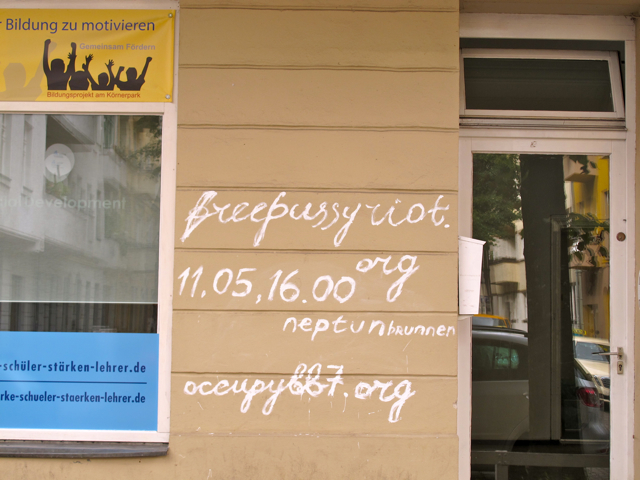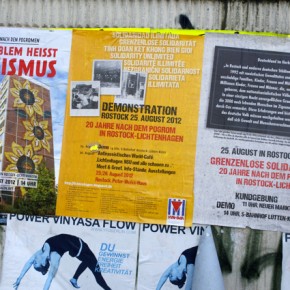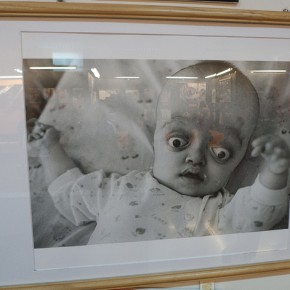Pussy Riot is the first Russian punk band to attain household name status in the West. The reason has less to do with its music than its politics. The subject of global media attention since three of its band members were arrested in February, the all-girl guerrilla group has become the unofficial face of Russia’s pro-democracy movement.
Their crime? Disrupting a religious service at Moscow’s Christ the Savior cathedral to perform a profanity filled protest song against Russian President Vladimir Putin. Incensed, Russian officials are taking a hard-line stance, and are charging that the band is guilty of “hooliganism.” State prosecutors are calling for a three-year sentence in this case.
Demonstrations in support of Pussy Riot have been held outside Russian embassies around the world. Major artists such as Bjork, Madonna, the Red Hot Chili Peppers and Sting have publicly voiced their support for the band and, are calling for their member’s immediate release. The amount of publicity generated in the Western media surrounding this story is simply astounding.
Most writers are attempting to present the story in cold Realpolitik terms. Unfortunately, it isn’t the straight politics of their case, or their cause that are igniting all the interest; rather, it is the romanticization in the West of their innocent rebellious spirit and the seductiveness of post-Communist Russian pop culture. We all know that a suburban white American punk band cannot change Wall Street, our political system or the banking structure.
In fact, if a white supremacist punk band pulled a similar stunt in an American place of worship to protest the Obama Presidency, they might find themselves in a similar situation — only they could be charged with a hate crime instead of “hooliganism.” There would be no Madonna or Sting championing for their release and they might get only a single paragraph of press in a local newspaper.
Yet, when this kind of thing happens in post-Perestroika Russia, where corruption is rampant, we find ourselves rooting for the brave and heroic girls in Pussy Riot. We believe in the possibility that they can bring about positive change in their own country, with their youthful energy and idealism. It’s a familiar story, to any rock and roll fan.
Russia, for the West, has nothing to do with Russian reality. It has to do with myth, fear and awe. Years of Cold War propaganda and distorted Hollywood portrayals have left us with a fascination for what was once called the “Evil Empire” by U.S. President Ronald Reagan. Just as many romanticize Prohibition-era Chicago gangsters and stylish German Nazis, Russians are simultaneously demonized and admired. Their society is viewed as a fractured mirror of the West, which lets us identify with Russians as much as we might at times revile them: their failures are very much those of our own.
The fall of Communism and the breakup of the Soviet Union gave Westerners a momentary opportunity to imagine that a new world order and ideal western-style society could emerge from its ruins. Instead, politics and power corrupted what we perceived as a possible Russian Renaissance (in our likeness) that would turn the nation into our international ally and willing trading partner. Things did not turn out in the way we had hoped. And now the West villainizes Putin and the Russian government every chance it gets. Just as Communism brought about a lost opportunity for utopia, so has its fall. Democracy and freedom survive only in the hands of corruption and greed.
What makes Russia different is that its present democracy is still young and fragile enough for us to imagine that it is not too late for change to occur. Unlike America, where very few believe that the mythical 99% can change what seems like a rock-solid set of social and economic institutions, in Russia, we can let our imaginations run wild while watching these girls in colorful knit hats disrupting Russian shopping malls, Stalin-era apartment blocks and church altars. As we watch them play their classic three-chord punk in videos on YouTube and see them setting off fire extinguishers and safety flares, we can let ourselves shout inside, “Yeah, we’re with you, let the Revolution begin!” We all want change, even while we hold onto our own security and stability.
It helps that few of us in the West can understand their lyrics. Instead, we fill them in with our own dreams and hopes for a brighter future. Pussy Riot has captured the West’s hearts mostly because their existence fills us up with naïve hope and happiness. Yet the place they hold in world consciousness and the feelings they inspire are a positive human force, even if no actual political change occurs as a result.
Who could have imagined that the whole world would be rooting for this little-known Russian punk band back last January. The completion of closing arguments in court last week, sentencing is expected on Friday, August 17. Putin has publicly called for leniency in the case, but his motives are in question given the perception of a widespread government crackdown on anti-government activism in Russia following his March election victory.
While all civilized countries have laws against disturbing the peace, the punishment that is being recommended by the government’s prosecution of Pussy Riot for their “punk prayer” seems very harsh by any standards. We can only hope for Pussy Riot’s sake — and our own — that the world court has already decided their fate, and that the Russian court will find a way to follow suit.
Photograph courtesy of Joel Schalit





